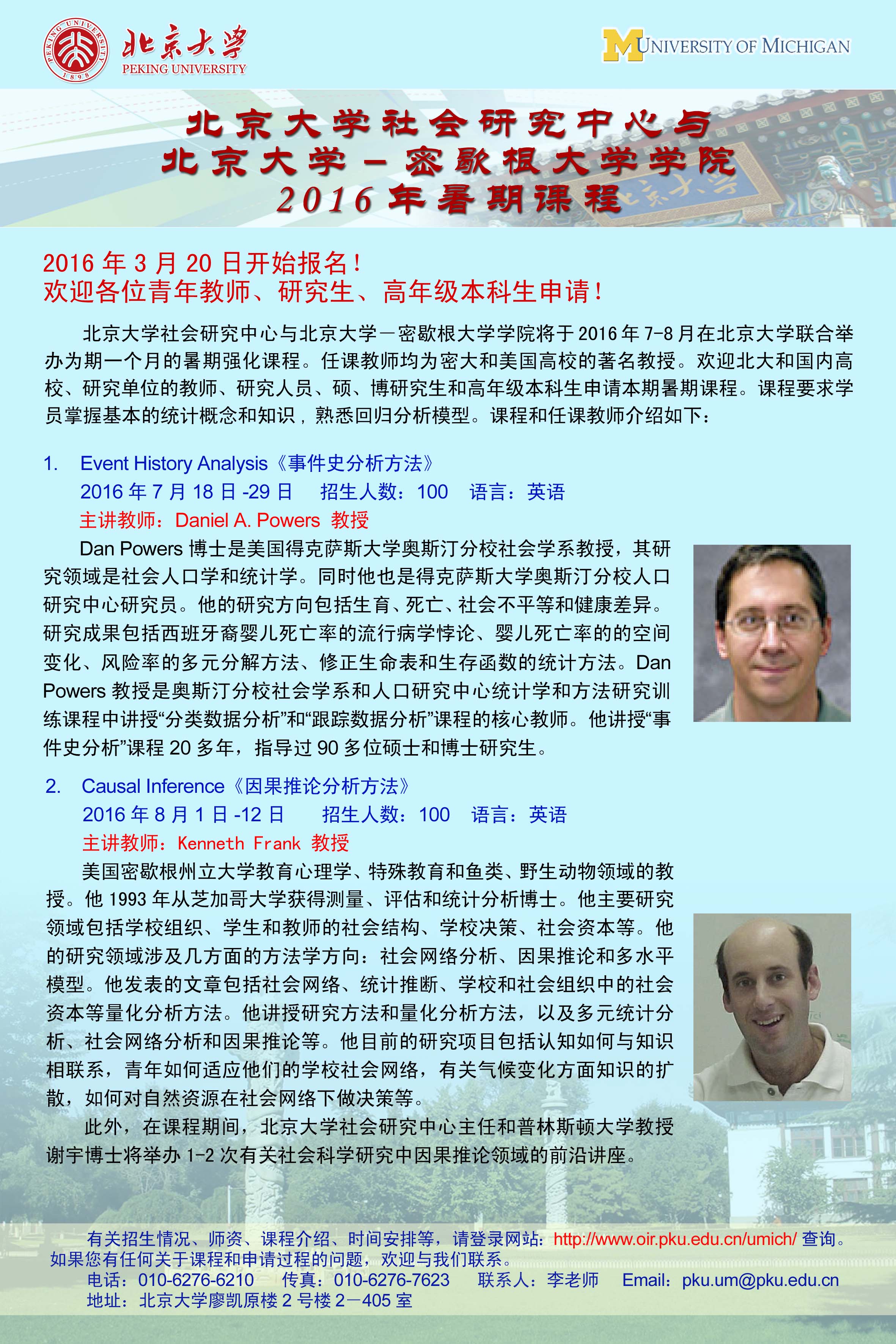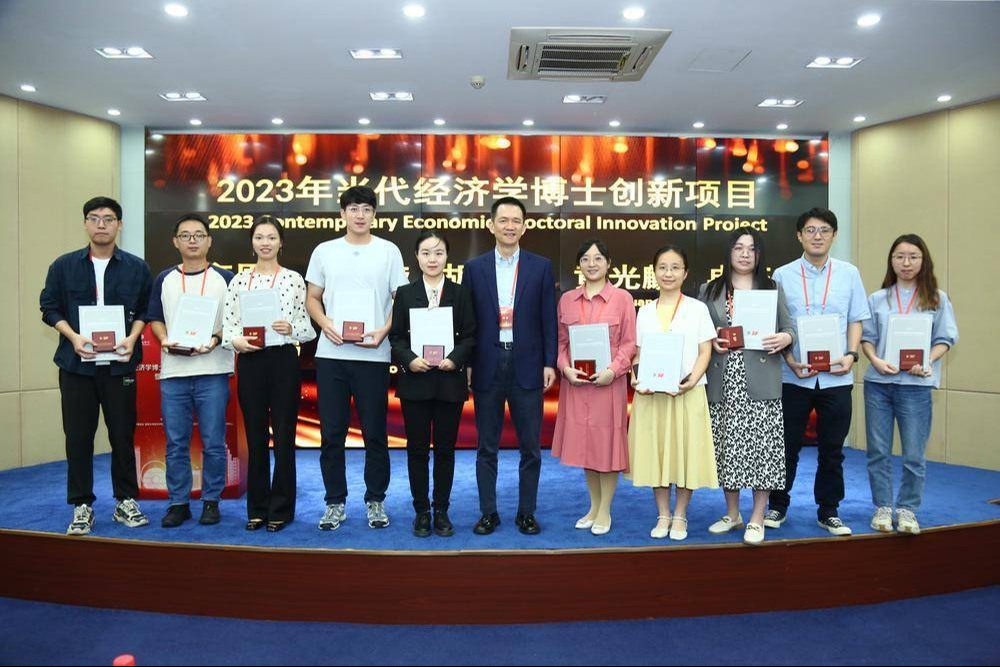北大社会研究中心与北大-密歇根大学学院暑期课程招生
通知公告 · 2016-03-11
返回北京大学社会研究中心与北京大学-密歇根大学学院
2016年暑期课程招生简章
2016年3月

北京大学社会研究中心与北京大学-密歇根大学学院将于2016年7月-8月在北京大学联合举办为期一个月的第10届暑期强化课程。任课教师均为密大和北美高校的著名教授。欢迎北大和国内高校、研究单位的教师、研究人员、硕、博研究生和高年级本科生申请本期暑期课程。课程要求学员掌握基本的统计概念和知识,熟悉回归分析模型。具体课程和任课教师介绍如下:
一、课程安排及介绍:
1、课程名称:Event History Analysis 《事件史分析方法》
时间:2016年7月18日至29日
课时:36学时 招生人数:100人 工作语言:英语
主讲教师:Daniel A. Powers教授
Dan Powers is a professor of sociology in the Department of Sociology at the University of Texas at Austin with interests in social demography and statistics. He is a research associate with the Population Research Center at the University of Texas at Austin where he has participated in funded research over the past 21 years. He has substantive research interests in fertility, mortality, social inequality, and health disparities. His research examines issues relating to the Hispanic epidemiological paradox in infant mortality, temporal change in infant mortality, multivariate decomposition methodology for hazard rates, and statistical methods for adjusting life tables and survivor functions. Dan plays a key role in statistics and methods training in the Department of Sociology and at the Population Research Center by teaching graduate courses in categorical data analysis and longitudinal data analysis. He has taught courses in Event History Analysis in the Department of Sociology for the past 20 years and at the Summer Statistics Institute at the University of Texas at Austin for the past 4 years. He has served on over 90 MS and Ph.D. committees, and is former graduate advisor and GSC chair of the masters in statistics program in the Division of Statistics and Scientific Computation at UT.
网址:http://www.utexas.edu/cola/depts/sociology/faculty/dpowers
课程介绍:
The purpose of this course is to introduce and apply methods and models for event history analysis. Event history analysis deals with methods for events occurring in time. This topic is also known as Survival Analysis, and includes the study of methods and models for the analysis of transition rates. This is an applied course that will draw on data from sociology, demography and health fields. The course will provide in-depth treatment of the most widely-used methods for event-history analysis. This course should be useful for graduate students and faculty in the social, behavioral, biological, and health sciences as well as applied researchers in a variety of fields.
Students should have had a course in basic statistics and a course in linear regression and some familiarity with a computer package. The intended audience is graduate students, researchers, and faculty members interested in an overview of event history modeling with the goal of understanding the theory, models, and methods for the analysis of event histories. This course will prepare participants to analyze event history data, and to understand the empirical application of these methodologies in their particular field of study.
2、课程名称:Causal Inference 《因果推论分析方法》
时间:2016年8月1日至12日
课时:36学时 招生人数:100人 工作语言:英语
主讲教师:Kenneth Frank教授
Kenneth Frank received his Ph.D. in measurement, evaluation and statistical analysis from the School of Education at the University of Chicago in 1993. He is currently a professor in Counseling, Educational Psychology and Special Education as well as in Fisheries and Wildlife at Michigan State University. His substantive interests include the study of schools as organizations, social structures of students and teachers and school decision-making, and social capital. His substantive areas are linked to several methodological interests: social network analysis, causal inference and multi-level models. His publications include quantitative methods for representing relations among actors in a social network, robustness indices for inferences, and the effects of social capital in schools and other social contexts. He teaches general introductory courses in research methods and quantitative methods as well as advanced courses in multivariate analysis and seminars in social network analysis and causal inference. Dr. Frank’s current projects include studies of how schools respond to increases in core curricular requirements, cognitive linkages among how aspects of knowledge, how adolescents respond to their social contexts in schools, the diffusion of knowledge about climate change, and how the decisions about natural resource use in small communities are embedded in social contexts.
网址:http://www.msu.edu/~kenfrank/
课程介绍:
There is currently great debate regarding the basis for causal inferences across the social sciences. Can we make causal inferences only from experiments? What about ethical or logistical limitations, or concerns that the experimental paradigm is artificial because of the necessity for extreme control over conditions? On the other hand, though observational studies are applied to natural conditions, can we rely on statistical control to make causal inferences? What about unmeasured, or unrecognized confounding factors? At what point does a statistical inference sustain a causal inference? Answers to these questions are more than merely academic and philosophical. For example they have immediate implications for policy-making regarding the implementation of innovations.
To address questions such as the above this course will explore causal inference from the perspectives of statistics and philosophy of science. We will begin with a comparison of causal inferences in the social sciences with those of the experimental sciences. Drawing on eclectic readings (Manski, Heckman, Rubin, Holland, Pearl, Shadish, Cook, Campbell Sobel, Dawid), we will use concepts such as the counterfactual, homogeneity of units and internal and external validity to describe causal inference. Furthermore, we will discuss statistical techniques such as propensity score matching and instrumental variables that might be used to improve the likelihood of valid inferences. Finally, we will use recent work to quantify how robust inferences are to potential threats the validity.
In the first half the course I will present methods including regression, propensity score matching, instrumental variables, regression discontinuity, random versus fixed effects, and sensitivity analysis. In the second half of the course we will turn to intensive projects or readings.
补充信息:
在《因果推论分析方法》课程期间,北京大学社会研究中心主任和普林斯顿大学教授谢宇博士将举办1-2次有关社会科学研究中因果推论领域的前沿讲座。
二、申请程序:
1.报名日期2016年3月20日-2016年5月30日。请登录网址http://www.oir.pku.edu.cn/umich 在线报名。
2. 2016年6月5日招生小组审核报名材料,并通知学生录取结果。
3. 学生收到录取通知(电子邮件)后,于2016年6月5日-25日缴费(具体办法和要求将在“缴费通知”中说明),并打印保管好缴费收据。
4. 在开课报到时,凭缴费收据领取正式通知书和北大开具的票据。请注意,非北大学生:中央非税收入统一票据;北大学生:中央行政事业单位资金往来结算票据(北大学生票据抬头只能写个人姓名)。
三、课程培训费/资料费:
非北大籍学生:1,200元/人/每门课程。 教师:1,500元/人/每门课程。
北大籍学生:1,000元/人/每门课程。
海外学员:2,000元/人/每门课程。
四、作业与考试:
课堂讨论、作业和考试由任课教师安排。
五、上课时间和地点:
上课时间:2016年7月18日-8月12日。
上课地点:北京大学(上课教室另行通知)
六、证书:
1、正式录取的学生学完规定的课时,完成必须的作业,通过考试后可获得规定的学分和由北京大学出具的成绩证明。
2、凡参加暑期课程的学员,完成必须的作业,通过考试后将获得由授课教师签名的单科结业证书
七、学习期间食宿:
学院不负责解决学生学习期间的食宿问题。食宿、生活等费用自理。
八、教材:教材、讲义等课程材料费用自理。
有关招生情况、师资、课程介绍、时间安排等,请登录网站:http://www.oir.pku.edu.cn/umich/查询。如果您有任何关于课程和申请过程的问题,欢迎与我们联系。
电话:010-6276-6210 传真:010-6276-7623 电邮:pku.um@pku.edu.cn
联系人:李老师
地址:北京大学廖凯原楼2号楼2-405室


